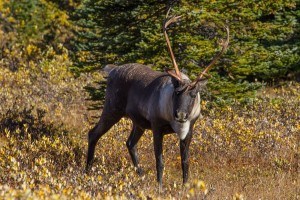
Parks Canada has closed the Maligne and Whistler Creek valleys for the majority of the winter.
According to an email announcement made Dec. 22, winter recreational access to the Maligne Valley will be delayed until Feb. 28, while the Whistler Creek valley will remain closed to recreationalists until Feb. 15.
The closures are part of Parks' efforts to protect critical caribou habitat, and were made in an announcement that Jasperites have been anticipating for weeks.
Few are happy about the decision, however.
In an interview Dec. 23, Jill Seaton of the Jasper Environmental Association (JEA) said that the closures are a half-measure, and won't do nearly enough to protect the extremely fragile caribou populations in Jasper.
She pointed out that the two areas Parks closed have already been open all winter, disturbing caribou and facilitating predator access while Jasperites flock to the popular winter destinations.
"It really is too little, too late," she said.
In an email statement sent the same day, the JEA commented that "The fact that both these areas will be open to the public again at the end of February —no matter what the snow conditions are—indicates that orders from Ottawa head office are still focused on protecting business interests rather than the caribou."
Seaton was also concerned that Maligne Lake Road will remain open all winter, increasing vehicle traffic in the area.
"The Maligne Road is still open. So the steps they have taken are the actual sort of minimum they could have done."
Loni Klettl of the Jasper Trail Alliance said shutting down the Maligne Valley is also a big blow to winter recreationalists.
Klettl said that most die-hard backcountry users care deeply about protecting the caribou (she applauded Parks' decision to act fast on the Whistlers Creek closures after recent caribou sitings on Marmot Basin), but said that winter recreation options in Jasper are becoming few and far between.
"Right now, we don't know where we're going to go. There is nowhere else we can go right now; there is nowhere else," she said.
She pointed out that most winter recreation in Jasper is being "pushed to the valley bottom" as Parks targets winter visitors, and while those routes are beautiful, dedicated users are losing the best winter terrain.
Jasper's backcountry users are hearty, and will find new routes, but, unlike the Maligne Valley, those routes will likely be extremely advanced, and inaccessible to most users.
"We're trying. We're desperately trying, and we're snuffling about—but there's not really much right now.
"We'll scrounge something, but the visitor gets robbed of everything that a winter park is supposed to be. And they’re being corralled into the valley bottoms."
The closures are part of Parks' recently intensified caribou conservation measures, and are legally required under the Species at Risk Act.
The act dictates that when a species is listed as threatened or endangered a recovery strategy is required, outlining what is scientifically required for the successful recovery of a species at risk, and setting out parameters to accomplish that.
Jasper's caribou belong to the Southern Mountain population, and are listed as threatened. When they were last counted, only 41 caribou remained in the park: five in the Maligne herd, six in the Brazeau and 30 in the Tonquin.
The recovery strategy for Southern Mountain caribou was released in June 2014, and Parks is legally obligated to implement it on national parks land.
The new closures are part of measures undertaken to do that, and in a document attached to its Dec. 22 announcement, Parks pointed out that while it has a legal obligation to prevent the destruction of caribou critical habitat, significant critical habitat protection measures are already in place in Jasper.
Those include monitoring and management activities to reduce predation risk to caribou; maintenance and protection of old-growth habitat; consideration of critical habitat protection in fire and vegetation management plans; and reduced speed zones on roads through critical habitat
The announcement came a full 25 days after a legal deadline Parks initially set for itself to implement habitat protection measures.
In an Oct. 29 press release Parks noted that the organization had a “legal obligation under the Species at Risk Act to implement caribou critical habitat protection measures by Nov. 28, 2014.”
That date came and passed with no meaningful comments from Parks, and the organization has refused to comment on the date, or provide any clarification about where the legal deadline stemmed from.
Parks' caribou conservation strategy has been under heavy scrutiny lately, but aside from an occasional written statement, the organization has had little to say to the public.
It remained silent on the fate of its captive breeding program, after its major partner in the project, the Calgary Zoo, backed out due to funding concerns.
In the document attached to information on the closures, Parks maintained that is "committed to the implementation of a captive breeding program to support Southern Mountain Caribou recovery objectives," but the organization has provided no meaningful information since the zoo pulled out of the project.
It also refuses to comment on the legal challenge brought forward by Ecojusitce lawyers, on behalf of the Canadian Parks and Wilderness Society and the JEA, challenging Supt. Greg Fenton's decision to proceed with plans for overnight accommodations at Maligne Lake, which the organizations are worried will significantly disrupt caribou there.
Parks Canada was unable to provide a spokesperson by the Fitzhugh's deadline.
Check back with the Fitzhugh for continued, in-depth coverage of the closures, and their implications for both caribou and winter recreationalists.
Trevor Nichols
[email protected]
